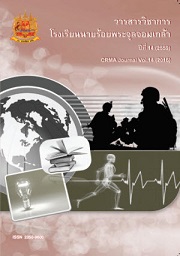Framework of Smart Farm Knowledge Management System
Main Article Content
Abstract
The objective of this journal paper is proposes the academic method framework for studying analysis methodology and survey solutions to summarize framework for developing knowledge management system for smart farm. To enhance standardize of Thai agriculture framework is purpose of this paper. The goals of purpose system must be collection, processing, preservation, and sharing information needs to operation related in smart farm field work.
Article Details
Copyright of all articles published is owned by CRMA Journal.
References
Sarka, H, Karel C,Miguel Ángel E, Walter M, Antonio C, Raul P., 2014. FOODIE – Open Data for Farmers [Online] http://www.foodie-project.eu/
Wong, D. M. L., 2010. Knowledge Management Catalyst for Sustainable development. ITSim 2010 (3), 1444-1449.
Mohamed, M., Stankosky, M., & Mohamed, M., 2009. An empirical assessment of knowledge management criticality for sustainable development. Journal of Knowledge Management, 13(5), 271 – 286.
Lwoga, E.T, Ngulube, P. & Stilwell, C., 2010. Managing indigenous knowledge for sustainable agricultural development in developing countries: Knowledge management approaches in the social context. The International Information & Library Review, 42(3).
Salami, P., Ahmadi, H., 2010. Review of Farm management Information Systems (FMIS). New York Sci J 3 (5), 87–95.
Beck, H., 2001. Agricultural enterprise information management using object databases, Java, and COBRA. Comput. Electron. Agric. 32 (2), 119–147.
Nikkilä, R., Seilonenen, I., Koskinenen, K., 2010. Software architecture for farm management information systems in precision agriculture. Comput. Electron. Agric. 70 (2), 328–336.
Sorensen, C.G., Fountas, S., Nash, E., Pesonen, L., Bochtis, D., Pedersen, S.M., Basso, B., Blackmore, S.B., 2010. Conceptual model of a future farm management information system. Comput. Electron. Agric. 72 (1), 37–47.
Alavi, M. & Leidner, D.E., 2001. Knowledge Management and Knowledge Management systems: Conceptualization and research issues, MIS Quarterly, 25(1), 107-136.
Fernandez, B., Gonzalez, A., & Sabherwal, R. , 2004. Knowledge management: Challenges solutions and technologies. Pearson Prentice Hall, New Jersey USA.
Liao, S, 2003. Knowledge management technologies and applications--literature review from 1995 to 2002. Expert Systems with Applications, Vol. 25, No. 2. (August 2003), pp. 155-164.
Polanyi, M., 1966. The Tacit Dimension. Routledge & Kegan Paul, London.
Nonaka, I., 1991. The Knowledge Creating Company. Harvard Business Review. Nov-Dec 1991.
Bruckmeier, K., & Tovey, H., 2008. Knowledge in Sustainable Rural Development: From Forms of Knowledge to Knowledge Processes. European Society for Rural Sociology, Vol. 48, p 313-329.
Ashraf, M.M. & Malik, B.T., 2011. Gonokendra model: a response to “information poverty” in rural areas of Bangladesh.Information Technology for development. 17(2), 153-161.
Brown, B. J., Hanson, M. E., Liverman, D.W., 1987. Global sustainability: Toward definition, Environmental Management. 11(6), 713-719.
Robertson, S., 2004. Scenarios in requirements discovery. In: Alexander, Maiden (Eds.), Scenarios, Stories, Use Cases: Through the System Development Life-Cycle. John Wiley & Sons, Chichester, UK.
Carroll, J.M., 1995. Introduction: the scenario perspective on the system development. In: Carroll, J.M. (Ed.), Scenario-based Design: Envisioning Work and Technology in System Development. Wiley, New York.
Alexander, I., 2004. Introduction: scenarios in system development. In: Alexander, Maiden (Eds.), Scenarios, Stories, Use cases: Through the System Development Life-Cycle. John Wiley & Sons, Chichester, UK.
Walsham, G., 1995. Interpretive case studies in IS research: nature and method. European Journal of Information Systems 1995 4, 74-81.


